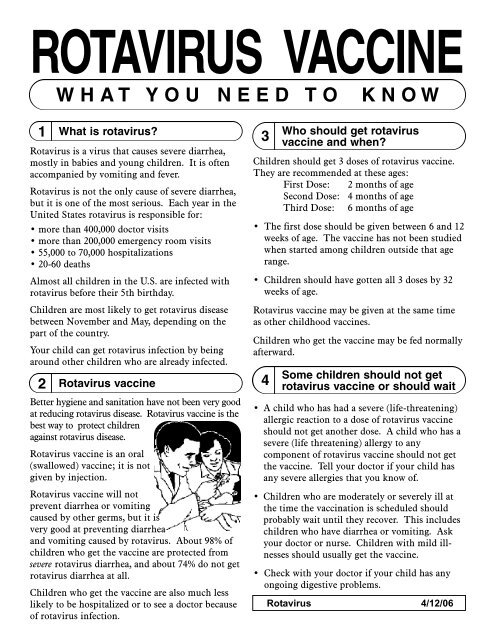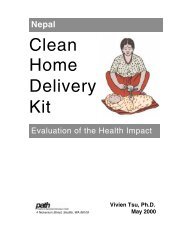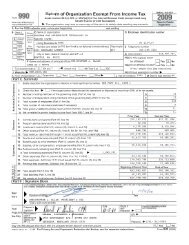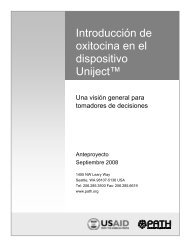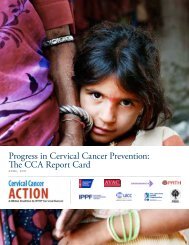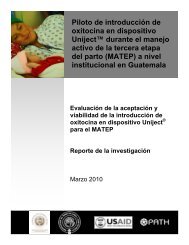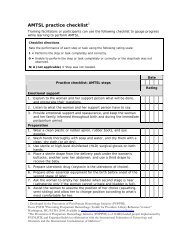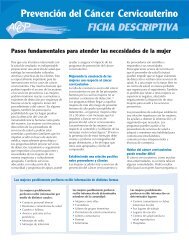Download file - Path
Download file - Path
Download file - Path
Create successful ePaper yourself
Turn your PDF publications into a flip-book with our unique Google optimized e-Paper software.
ROTAVIRUS VACCINE<br />
W H A T Y O U N E E D T O<br />
K N O W<br />
1 What is rotavirus?<br />
Rotavirus is a virus that causes severe diarrhea,<br />
mostly in babies and young children. It is often<br />
accompanied by vomiting and fever.<br />
Rotavirus is not the only cause of severe diarrhea,<br />
but it is one of the most serious. Each year in the<br />
United States rotavirus is responsible for:<br />
• more than 400,000 doctor visits<br />
• more than 200,000 emergency room visits<br />
• 55,000 to 70,000 hospitalizations<br />
• 20-60 deaths<br />
Almost all children in the U.S. are infected with<br />
rotavirus before their 5th birthday.<br />
Children are most likely to get rotavirus disease<br />
between November and May, depending on the<br />
part of the country.<br />
Your child can get rotavirus infection by being<br />
around other children who are already infected.<br />
2 Rotavirus vaccine<br />
Better hygiene and sanitation have not been very good<br />
at reducing rotavirus disease. Rotavirus vaccine is the<br />
best way to protect children<br />
against rotavirus disease.<br />
Rotavirus vaccine is an oral<br />
(swallowed) vaccine; it is not<br />
given by injection.<br />
Rotavirus vaccine will not<br />
prevent diarrhea or vomiting<br />
caused by other germs, but it is<br />
very good at preventing diarrhea<br />
and vomiting caused by rotavirus. About 98% of<br />
children who get the vaccine are protected from<br />
severe rotavirus diarrhea, and about 74% do not get<br />
rotavirus diarrhea at all.<br />
Children who get the vaccine are also much less<br />
likely to be hospitalized or to see a doctor because<br />
of rotavirus infection.<br />
3<br />
Who should get rotavirus<br />
vaccine and when?<br />
Children should get 3 doses of rotavirus vaccine.<br />
They are recommended at these ages:<br />
First Dose: 2 months of age<br />
Second Dose: 4 months of age<br />
Third Dose: 6 months of age<br />
• The first dose should be given between 6 and 12<br />
weeks of age. The vaccine has not been studied<br />
when started among children outside that age<br />
range.<br />
• Children should have gotten all 3 doses by 32<br />
weeks of age.<br />
Rotavirus vaccine may be given at the same time<br />
as other childhood vaccines.<br />
Children who get the vaccine may be fed normally<br />
afterward.<br />
4<br />
Some children should not get<br />
rotavirus vaccine or should wait<br />
• A child who has had a severe (life-threatening)<br />
allergic reaction to a dose of rotavirus vaccine<br />
should not get another dose. A child who has a<br />
severe (life threatening) allergy to any<br />
component of rotavirus vaccine should not get<br />
the vaccine. Tell your doctor if your child has<br />
any severe allergies that you know of.<br />
• Children who are moderately or severely ill at<br />
the time the vaccination is scheduled should<br />
probably wait until they recover. This includes<br />
children who have diarrhea or vomiting. Ask<br />
your doctor or nurse. Children with mild illnesses<br />
should usually get the vaccine.<br />
• Check with your doctor if your child has any<br />
ongoing digestive problems.<br />
Rotavirus 4/12/06
• Check with your doctor if your child’s immune<br />
system is weakened because of:<br />
- HIV/AIDS, or any other disease that affects<br />
the immune system<br />
- treatment with drugs such as long-term<br />
steroids<br />
- cancer, or cancer treatment with x-rays or<br />
drugs<br />
• Check with your doctor if your child recently<br />
had a blood transfusion or received any other<br />
blood product (such as immune globulin).<br />
In the late 1990s a different type of rotavirus vaccine<br />
was used. This vaccine was found to be associated<br />
with an uncommon type of bowel obstruction called<br />
“intussusception,” and was taken off the market.<br />
The new rotavirus vaccine has been tested with more<br />
than 70,000 children and has not been associated with<br />
intussusception.<br />
However, once a person has had intussusception, from<br />
any cause, they are at higher risk for getting it again. So<br />
as a precaution, it is suggested that if a child has had<br />
intussusception they should not get rotavirus vaccine.<br />
5<br />
What are the risks from<br />
rotavirus vaccine?<br />
A vaccine, like any medicine, could possibly cause<br />
serious problems, such as severe allergic reactions.<br />
The risk of rotavirus vaccine causing serious<br />
harm, or death, is extremely small.<br />
Getting rotavirus vaccine is much safer than<br />
getting the disease.<br />
Mild problems<br />
Children are slightly (1-3%) more likely to have<br />
mild, temporary diarrhea or vomiting within 7<br />
days after getting a dose of rotavirus vaccine than<br />
children who have not gotten the vaccine.<br />
Moderate or severe reactions have not been<br />
associated with this vaccine.<br />
If rare reactions occur with any new product, they<br />
may not be identified until thousands, or millions,<br />
of people have used it. Like all vaccines, rotavirus<br />
vaccine will continue to be monitored for unusual<br />
or severe problems.<br />
Vaccine Information Statement (Interim)<br />
Rotavirus (4/12/06)<br />
6<br />
What if there is a moderate or<br />
severe reaction?<br />
What should I look for?<br />
• Any unusual condition, such as a high fever or<br />
behavior changes. Signs of a serious allergic<br />
reaction can include difficulty breathing, hoarseness<br />
or wheezing, hives, paleness, weakness, a<br />
fast heart beat or dizziness.<br />
What should I do?<br />
• Call a doctor, or get the person to a doctor right away.<br />
• Tell your doctor what happened, the date and time<br />
it happened, and when the vaccination was given.<br />
• Ask your doctor, nurse, or health department to<br />
report the reaction by filing a Vaccine Adverse<br />
Event Reporting System (VAERS) form.<br />
Or you can <strong>file</strong> this report through the VAERS<br />
web site at www.vaers.hhs.gov, or by calling<br />
1-800-822-7967.<br />
VAERS does not provide medical advice.<br />
7<br />
The National Vaccine Injury<br />
Compensation Program<br />
In the rare event that you or your child has a<br />
serious reaction to a vaccine, a federal program has<br />
been created to help pay for the care of those who<br />
have been harmed.<br />
For details about the National Vaccine Injury<br />
Compensation Program, call 1-800-338-2382 or<br />
visit their website at<br />
www.hrsa.gov/vaccinecompensation.<br />
8 How can I learn more?<br />
• Ask your doctor or nurse. They can give you the<br />
vaccine package insert or suggest other sources<br />
of information.<br />
• Call your local or state health department.<br />
• Contact the Centers for Disease Control and<br />
Prevention (CDC):<br />
- Call 1-800-232-4636 (1-800-CDC-INFO)<br />
- Visit CDC’s National Immunization Program<br />
website at: www.cdc.gov/nip<br />
department of health and human services<br />
Centers for Disease Control and Prevention<br />
National Immunization Program


